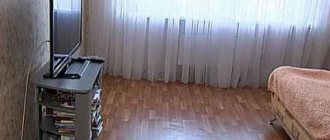The need to determine the procedure for using residential premises arises, as a rule, due to hostile relations that have arisen between family members (former family members) of the owner and tenant. The conflict leads to the creation of obstacles to one of the family members (former family members) in the use of housing, which is expressed, first of all, in changing door locks, putting things out, creating other obstacles, even causing harm to the health of a family member when the latter tries to enter into a disputed living space.
The appropriate way to protect the violated right in this situation is a claim for occupancy and determination of the order of use, in which the plaintiff indicates which isolated residential premises in the apartment or house he asks to be allocated for his use, and which to leave for the use of the defendants. If the disputed residential premises have only one room, this does not mean that the claim to determine the order of use will be denied. In this case, the court will satisfy the demand for occupancy and indicate that the disputed room is transferred for the use of the plaintiff and defendants. It is clear that the practical value of the court determining the order of use of one room is zero.
Procedure for using your own apartment and an apartment occupied under a social tenancy agreement
The Housing Code of the Russian Federation does not regulate relations to determine the procedure for using residential premises; the relevant norms are contained in the Civil Code of the Russian Federation. According to Article 247 of the Civil Code of the Russian Federation, ownership and use of property in shared ownership is carried out by agreement of all its participants, and if agreement is not reached, in the manner established by the court. A participant in shared ownership has the right to be given for his possession and use a part of the common property commensurate with his share, and if this is not possible, he has the right to demand from other participants who own and use the property falling on his share, appropriate compensation.
If, when determining the procedure for using residential premises owned by people, there are no problems in interpreting the rules of law to be applied, then when determining the procedure for using residential premises occupied by citizens under a social tenancy agreement, there are two opposing positions:
- first: the procedure for use cannot be determined, since the Housing Code of the Russian Federation does not contain the relevant legal norms allowing this to be done. In addition, Article 69 of the Housing Code of the Russian Federation contains an imperative norm on the equal rights of the tenant and members of his family to the occupied residential premises.
- second: the procedure for use can be determined by applying the analogy of the law (Article 247 of the Civil Code of the Russian Federation).
The court will refuse to determine the procedure for using an apartment in social rent
An analysis of judicial practice shows that the courts adhere to the first point of view and refuse claims to determine the procedure for using residential premises occupied under a social tenancy agreement.
According to Part 2 of Article 69 of the Housing Code of the Russian Federation, family members of the tenant of a residential premises under a social tenancy agreement have equal rights and obligations with the tenant. As follows from part 4 of this article, if a citizen ceases to be a member of the family of the tenant of a residential premises under a social tenancy agreement, but continues to live in the occupied residential premises, he retains the same rights as the tenant and members of his family. The said citizen is independently responsible for his obligations arising from the relevant social tenancy agreement.
As stated in the above rule of law, not only members of his family, but also former family members who continue to live in this residential premises have equal rights with the tenant. The right to use the occupied residential premises (and not some part of it) is one of the rights of the tenant, which, if the procedure for use is determined, will undoubtedly be limited, since as a result the right of the disputing parties to use part of the residential premises will cease, which is contrary to the mandatory rule of law, contained in Article 69 of the RF Housing Code.
Services for citizens and organizations
| Oral (face-to-face) legal consultation with the duty lawyer with the study of documents submitted by the client | from 2,400 rub. |
| Oral (face-to-face) legal consultation with an industry specialist lawyer with the study of documents submitted by the client | from 4,800 rub. |
| Study by a specialist lawyer of the case materials presented by the client, judicial practice in the case, development of the legal position of the defense (using professional legal resources), outside the framework of an oral consultation | from 1,200 rub. |
| Departure of the duty lawyer to the principal | from 3,000 rub. |
| Preparation of the primary written legal document (application, complaint, petition, legal opinion) | from 7,000 rub. |
| Oral (face-to-face) legal consultation from an industry specialist lawyer without studying documents | from 2,400 rub. |
| Oral (face-to-face) legal consultation of the duty lawyer without studying documents | from 1,200 rub. |
| Hourly wages for a specialist lawyer for comprehensive protection of the client’s rights | from 2,500 rub. |
| Lawyer's request to government institutions and organizations | 4,800 rub. |
Examples of refusals in a claim to determine the procedure for using social housing
Example 1. The court decided to move the plaintiffs into an apartment; the court rejected the claim regarding the determination of the procedure for using the apartment
The cassation court, upholding the decision of the first instance court, indicated: during the consideration of the case, the court found that V.A. does not have the opportunity to use the disputed residential premises provided under the social tenancy agreement due to the fact that M.V. is preventing this.
Under the above circumstances, due to the fact that the tenant and his family members have an equal right to use residential premises under a social tenancy agreement, V.A. has no other residential premises. is not available for permanent residence, the court reasonably moved V.A. together with his minor son M. to the disputed apartment and ordered the defendant not to interfere with their use of the apartment. The court rightfully rejected the claim regarding the determination of the procedure for using the apartment, since the possibility of changing the social tenancy agreement is not provided for by the Housing Code of the Russian Federation (Determination of the Ulyanovsk Regional Court dated August 26, 2008)
Example 2. The court rejected a claim to determine the procedure for using residential premises
B. filed a lawsuit against E. and Yu. to move her into apartment A and to determine the procedure for using the living space by allocating a room of 13.1 square meters for her use for living. m.
In support of the claim, she indicated that she is the tenant of the disputed apartment, lived in it with her husband, daughter - E. and grandson - V. Also, her son-in-law - Yu lives in the apartment without registration. After the death of her husband on September 19, 2006 due to bad relations She and her son-in-law went to her son’s apartment. The defendants threw out her things, changed the lock on the front door, and did not allow her to go home on December 6, 2006 to receive her pension.
The court of first instance satisfied B.'s claim, moved B. into the apartment, determined the procedure for using the living space: allocated a room with a balcony with an area of 13.1 square meters for B.'s use. m, for the use of E. and V. - a room with an area of 17.9 sq. m. m, common areas - corridor, kitchen, bathroom - left for joint use of the parties.
The judicial panel of the regional court canceled the decision of the court of first instance in terms of satisfying the claims to determine the procedure for using residential premises, indicating the following.
B.’s right to use the disputed residential premises under the terms of social rent, the existence of her rights as a tenant of residential premises was not disputed by the defendants. The court's decision regarding the plaintiff's move into the disputed residential premises is also not disputed.
The court correctly pointed out that the current housing legislation (Housing Code of the Russian Federation, Rules for the use of residential premises approved by Decree of the Government of the Russian Federation of January 21, 2006 N 25) does not regulate the issue of determining the procedure for using residential premises occupied under a social tenancy agreement, when the absence of an agreement between the employer and his family members and the emergence of a dispute.
The Housing Code of the Russian Federation provides an exhaustive list of grounds for changing, terminating and terminating a social tenancy agreement. The circumstances indicated by the plaintiff do not constitute a legal basis for changing the social tenancy agreement for the disputed residential premises. The plaintiff did not provide evidence that before the plaintiff was forced to leave the disputed residential premises, there was any specific procedure for using the residential premises.
Since the plaintiff’s demand to determine the procedure for using the disputed residential premises by assigning to her a separate room with an area of 13.1 sq. m, and behind the E. and E. there are rooms of 17.9 sq. m. m is not based on the law, violates the rights and legitimate interests of the defendant E. and her minor son V., members of the employer’s family, the court’s decision in this part cannot be recognized as legal and justified and is subject to cancellation.
By canceling the court decision in this part, the judicial panel makes a new decision to refuse to satisfy the claims to determine the procedure for using residential premises, without sending the case for a new trial, since the circumstances relevant to the case are established on the basis of the available evidence (Determination of the Sverdlovsk Regional Court dated May 15, 2007 in case No. 33-3210/2007).
Example 3. The supervisory court overturned judicial acts determining the procedure for using an apartment
The plaintiffs' demands to determine the procedure for using residential premises occupied under a social tenancy agreement were satisfied by the courts of first instance and cassation, however, these judicial acts were overturned in supervision.
According to the clarified requirements, the plaintiff, among other demands, asked to oblige branch No. 2 of REU No. 2 MP of the city of Omsk “Housing Economy” to conclude with her an independent contract for the social rental of residential premises with the division of a personal account.
The district court found it possible to satisfy the plaintiff’s demands for the division of personal accounts and imposing the obligation on the defendant to open a separate financial account for the plaintiff, proportional to the area of the disputed living space for her and her son, 29.06 square meters in the apartment. In addition, taking into account the fact that currently the parties are not members of the same family, the court considers it possible to determine the procedure for using the residential premises as follows: a room with an area of 16.4 sq.m. in the apartment to assign to the plaintiff and her minor son, a room with an area of 10.5 sq.m. assigned to the defendant. Communal areas shall be transferred to joint use. The plaintiff’s demands to conclude a separate contract for the social rental of residential premises will be refused (see for more details the Decision of the Leninsky District Court of Omsk dated May 31, 2007).
Leaving the decision unchanged, the judicial panel for civil cases of the Omsk Regional Court, in its ruling dated August 29, 2007 in case No. 33-2755, indicated that the court correctly, taking into account the interests of the parties, determined the procedure for using residential premises and the scope of participation of a former family member of the tenant in obligations , arising from the social tenancy agreement (see in more detail the cassation ruling of the Omsk Regional Court dated August 29, 2007).
The supervisory court overturned these judicial acts and dismissed the claim. By the resolution of the Presidium of the Omsk Regional Court dated December 25, 2007 (case No. 44-G-194), the decision of the Leninsky District Court of Omsk dated May 31, 2007 and the ruling of the judicial panel for civil cases of the Omsk Regional Court dated August 29, 2007 regarding the satisfaction of the claim on determining the procedure for using residential premises was cancelled. The claim to determine the procedure for using residential premises was rejected.
The Presidium indicated that Article 82 of the RF Housing Code, which was in force at the time the dispute was considered by the court, provides for only two cases of changing a social tenancy agreement.
- Firstly, when uniting citizens living in an apartment into one family;
- Secondly, a social tenancy agreement can be changed if the employer recognizes another family member as capable (for example, the employer has moved out, died or refuses to fulfill his duties).
In accordance with the Housing Code of the Russian Federation, a social tenancy agreement can also be changed:
- upon departure of any member of the employer's family (Article 69);
- the introduction of other citizens as family members (Article 70);
- reconstruction or redevelopment of residential premises (Article 26);
- receiving vacated living space in an apartment (Article 59).
The Housing Code of the Russian Federation and other federal laws do not contain a rule granting a family member of the tenant the right to conclude a separate rental agreement with the allocation of isolated residential premises.
Since at the time this dispute arose (the claim was filed in August 2005), the Housing Code of the Russian Federation was in force, the court, when resolving the case regarding the plaintiff’s demands to determine the procedure for using residential premises, should have been guided by the Housing Code of the Russian Federation.
By ruling of the judge of the Supreme Court of the Russian Federation No. 50-F08-184 of June 24, 2008. refusal to transfer the supervisory appeal for consideration at a court hearing of the Judicial Collegium for Civil Cases of the Supreme Court of the Russian Federation
We recommend on this topic: “Determination of the procedure for using residential premises occupied under a social tenancy agreement. Review of judicial practice"
APPEAL DECISION
The court of appeal of the Kirov district of Omsk examined in open court in Omsk on October 11, 2007 the case on the appeal of Yu.A. on the decision of the magistrate of court district No. 51 of the KAO of Omsk in civil case No. 2-3189/2007. according to the claim of Yu.A. to T.K., E.Yu., Zh.Yu. on determining the procedure for using residential premises with the opening of separate financial personal accounts,
INSTALLED:
Yu.A. appealed to the magistrate with a claim against T.K., E.Yu., Zh.Yu. on determining the procedure for using residential premises. In support of the claim, he indicated that he is the tenant of apartment 104 in building 11 on the street. Mill in Omsk. The following apartments also live: T.K., E.Yu. and Zh.Yu. In 1994, his marriage to T.K. was dissolved; from that time on, he did not actually live in the said residential premises due to the fact that former family members put obstacles in his use. By decision of the Kirovsky District Court of Omsk dated November 29, 2005, he was moved into the disputed apartment, but at present he cannot use the housing, since all three rooms are occupied by the defendants and they are unable to vacate at least one of them. In addition, in the absence of a court-established procedure for the use of residential premises, he is not able to pay for the rental of residential premises based on the actual area occupied by them. In this connection, he asks to determine the procedure for using the disputed apartment, establishing that the room has an area of 12.4 sq.m. is in his use, rooms with an area of 18.5 sq.m. and 13.4 sq.m. transfer for use to defendants T.K., E.Yu. and Zh.Yu.
On July 16, 2007, at the court hearing, the plaintiff supplemented the requirements, asking, when determining the procedure for using the disputed apartment, to open a separate financial personal account for a room with an area of 12.4 sq.m. to pay utility bills.
Plaintiff Yu.A. at the court hearing he supported the demands in full, he explained to the court that in 1986 he moved into the disputed apartment on the basis of a warrant for a family of 4 people. He has not lived in this apartment since 1994, as he previously went to work in the north and had another family. Currently, he comes to the apartment periodically; he does not have a specific place in the apartment where he could bring his things.
Representative of the plaintiff A.A. supported the claims in full on the grounds set out by his principal, who asked for the claim to be satisfied.
Defendant T.K. did not recognize the claims, explained to the court that Yu.A. has not lived in an apartment since 1989. In 1994, the plaintiff was moved into the apartment by a court decision, but did not move into it or live in it. In 2005, he was moved into the apartment again, the keys were given to him, after moving in he never lived in the apartment, he only brought his dirty things, which they took into the vestibule and put in a box. Since 1998, the apartment has a procedure for use, according to which she lives in a room with an area of 14.1 sq.m., E.Yu. lives in a room of 17.4 sq.m., Zh.Yu. in the room 12.4 sq.m. They use all the rooms, if assigned to Yu.A. rooms, their living conditions will worsen, which will lead to a violation of their housing rights. She does not object to the plaintiff living in the apartment and also using all the rooms.
Representative of the defendant T.K. by proxy N.A. (ld.23), did not recognize the claims, believes that the stated requirements cannot be satisfied, since the determination of the procedure for using residential premises is not provided for by the norms of housing legislation. In addition, determining the procedure for using residential premises is possible only in cases where such a determination does not violate the rights and legitimate interests of other persons and if in the disputed apartment a certain procedure for using residential premises has developed between persons living together. Despite the plaintiff repeatedly moving into the disputed apartment on the basis of court decisions, he did not actually try to move in.
Defendant E.Yu. did not recognize the claims on similar grounds.
Defendant Zh.Yu. did not appear at the court hearing, was duly notified, provided a statement in which she asked to consider the case in her absence, and did not agree with the claim.
The third party, Levoberezhye OJSC, was duly notified and did not send a representative to the court.
The magistrate ruled: “In the claim of Y.A. to T.K., E.Yu., Zh.Yu. on determining the procedure for using apartment No. 104 in building 11 on the street. Melnichnaya in the city of Omsk with the opening of separate personal accounts for payment for housing maintenance and utilities "Levoberezhye" was notified of the day of consideration of the case by the appellate instance (case sheet 83), but did not send a representative to the court.
After listening to the participants in the process and examining the case materials, the court finds the decision of the magistrate to be canceled on the following grounds.
When resolving the dispute, the magistrate incorrectly applied the norms of substantive law, namely housing legislation.
In accordance with paragraph 1 of Article 40 of the Constitution of the Russian Federation, everyone has the right to housing. No one can be arbitrarily deprived of their home.
From clause 4 of Article 3 of the Housing Code of the Russian Federation it follows that no one can be limited in the right to use housing except on the grounds and in the manner provided by law.
According to Art. 5 Federal Law of the Russian Federation dated December 29, 2004. No. 189-FZ “On the entry into force of the Housing Code of the Russian Federation” to housing relations that arose before the entry into force of the Housing Code of the Russian Federation, the Housing Code of the Russian Federation applies to those rights and obligations that arise after its entry into force, with the exception of cases provided for this Federal Law.
According to the rules of Art. 50 of the Housing Code of the RSFSR (Article 61 of the Housing Code of the Russian Federation), the use of residential premises in houses of state and public housing stock is carried out in accordance with the rental agreement for residential premises and the rules for the use of residential premises.
According to Art. 52 of the Housing Code of the RSFSR (Article 62 of the Housing Code of the Russian Federation), the subject of a rental agreement can only be an isolated residential premises, consisting of an apartment or one or more rooms. By virtue of Art. 51 of the Housing Code of the RSFSR, the contract for the rental of residential premises in houses of the state and public housing stock is concluded in writing on the basis of a warrant for residential premises between the landlord and the tenant - the citizen in whose name the warrant was issued.
In accordance with Art. 53 of the Housing Code of the RSFSR, members of the tenant's family living together with him enjoy, on an equal basis with the tenant, all rights and bear all obligations arising from the rental agreement for residential premises. Adult family members bear joint and several property liability with the tenant for the obligations arising from the specified agreement (Part 1). Members of the employer's family include the employer's spouse, their children and parents. Other relatives, disabled dependents, and in exceptional cases other persons may be recognized as members of the employer’s family if they live together with the employer and maintain a common household with him (Part 2). If the citizens specified in part two of this article have ceased to be members of the tenant’s family, but continue to live in the occupied residential premises, they have the same rights and obligations as the tenant and members of his family (Part 3).
From the case materials it follows that the disputed apartment 104 in building 11 on the street. The mill in the city of Omsk consists of three isolated rooms with an area of 12.4 sq.m., 14.1 sq.m. and 17.4 sq.m. (case file 39 - copy of technical passport). This apartment currently retains municipal status, which is confirmed by a copy of the personal account (case sheet 9). The apartment was provided to the plaintiff Yu.A. in 1986, and his wife T.K. and daughters E.Yu. moved into the apartment with him. and Zh.Yu. (copy of order case file 43). The plaintiff is not registered as the owner of the property (certificates of the Federal Registration Service 00 - case file 37, SE "OTsTIZ" - sheet case 38).
By the decision of the Kirovsky District Court of Omsk dated December 7, 1994, Yu.A. was moved into the disputed apartment, his demands to determine the procedure for using the residential premises were denied (case files 17-21). By the decision of the Kirovsky District Court of Omsk dated November 29, 2005, Yu.A. was again moved into the disputed apartment (ld. 12-14).
At the same time, from the explanations of the parties it is established that the plaintiff does not actually use this apartment for living, although he has access to it. This is due to the fact that the parties have not reached an agreement on the procedure for using the living quarters in the apartment. In this connection, the plaintiff filed the claim under consideration.
The appellate court cannot agree with the conclusions of the magistrate about the impossibility of using the analogy of law and law to resolve this dispute.
In accordance with paragraph 2 of Article 1 of the Housing Code of the Russian Federation, citizens, at their own discretion and in their own interests, exercise their housing rights, including disposing of them. They are free to establish and exercise their housing rights by virtue of an agreement and (or) other grounds provided for by housing legislation. At the same time, citizens must not violate the rights, freedoms and legitimate interests of other citizens.
According to the provisions of paragraph 3 of the same article of the RF Housing Code, housing rights can be limited on the basis of federal law and only to the extent necessary in order to protect the foundations of the constitutional system, morality, health, rights and legitimate interests of other persons.
Paragraph 1 of Article 7 of the Housing Code of the Russian Federation provides that in cases where housing relations are not regulated by housing legislation or an agreement of participants in such relations, and in the absence of civil or other legislation directly regulating such relations, the law shall be applied to them, unless this contradicts their essence, housing legislation regulating similar relations (analogy of law).
Since there is no agreement on the procedure for using residential premises in the apartment between the parties who, in accordance with Art. 60 - 61 of the Housing Code of the Russian Federation equal rights of ownership and use of the specified apartment, and Chapter 8 of the Housing Code of the Russian Federation does not directly regulate the procedure for such use in the case of social rental of residential premises. The court considers it possible, in order to protect the rights and legitimate interests of the plaintiff, to apply by analogy the provisions of civil law on the procedure for owning and using residential premises owned by citizens who have equal rights to it.
In this case, the court takes into account the provisions of Art. 15 - 16 of the Housing Code of the Russian Federation on objects of housing rights, i.e. about living space and its types. The application of the analogy of the law to the relations of use in the social rental of residential premises does not contradict their essence and complies with the provisions of paragraph 4 of Art. 17 of the Housing Code of the Russian Federation, which establishes that the use of residential premises is carried out taking into account the observance of the rights and legitimate interests of citizens living in this residential premises.
According to Art. Art. 244, 247 of the Civil Code of the Russian Federation, property (indivisible things) can be in common ownership with the determination of the share of each participant (shared ownership). In this case, the participants own and use the common property by agreement between them, and if agreement is not reached, in the manner established by the court. A participant in shared ownership has the right to be given possession and use of a part of the common property commensurate with his share, and if this is not possible, he has the right to demand appropriate compensation from other participants who own and use the property falling on his share.
The area of the room claimed by the plaintiff is 12.4 square meters. m, according to the technical passport it is smaller than the other living rooms (case sheet 39). The defendants' reference to the fact that in this case the plaintiff will be allocated a room larger than his share cannot be recognized by the court as justified.
The total area of the apartment is 61.4 square meters. m, residential 43.9 sq. m, the apartment was provided for a family of 4 people, i.e. to the same composition of persons who participate in the trial. Each of them accounts for 15.35 square meters. m of total area and 10.98 sq. m of living space. When the specified room is allocated to the plaintiff, other persons will be assigned for use two isolated rooms with a living area of 17.4 square meters. m and 14.1 sq. m, total 31.5 sq. m, i.e. each person will have 10.5 square meters. m, and the difference is 0.48 sq. m will not significantly worsen the housing rights of the defendants. In turn, the plaintiff’s legal rights to use residential premises on an equal basis with other former members of his family in accordance with Art. 67 of the Housing Code of the Russian Federation with this procedure for use will be restored.
Considering that the court previously satisfied the requirements for the placement of Yu.A. to the disputed apartment, however, there is no agreement on the procedure for using and providing a room for the plaintiff to live in, the appellate court considers it possible to overturn the decision of the magistrate in the case and satisfy the plaintiff’s demands by providing him with the use of the smallest room in the disputed apartment with an area of 12.4 square meters .m. The defendants are to assign rooms with an area of 14.1 sq.m. for use. and 17.4 sq.m.
Since the plaintiff and defendants are not members of the same family, according to the rules of paragraph 4 of Art. 69 of the Housing Code of the Russian Federation, they are independently responsible for their obligations arising from the social tenancy agreement. The court, taking into account the procedure for using the disputed apartment, determined by the court, considers it possible to satisfy the plaintiff’s request to open a separate personal financial account in his name for a room with an area of 12.4 square meters. m to pay for utilities, and for the defendants - for two rooms with an area of 17.4 square meters. m and 14.1 sq. m, also for paying utilities.
Guided by Art. 327-330, 194-199 Code of Civil Procedure of the Russian Federation, the court
DECIDED:
To cancel the decision of the magistrate of court district No. 51 of the KAO of Omsk in civil case No. 2-3189/2007. according to the claim of Yu.A. to T.K., E.Yu., Zh.Yu. on determining the procedure for using residential premises with the opening of separate financial personal accounts.
Determine the procedure for using residential premises in apartment 104 of building 11 on Melnichnaya Street in the city of Omsk, assigning it to Yu.A. for use of a room of 12.4 sq. m., for T.K., E.Yu., Zh.Yu. - two rooms with an area of 17.4 square meters. m and 14.1 sq. m, with the division of a personal financial account for paying utilities.
The decision of the appellate court comes into force from the date of its adoption.
Case Study
We were contacted by a young man who was registered in a municipal apartment along with his minor child and father. The apartment was a two-room apartment; after the birth of the child, the client and the father had a dispute over the use of the apartment, who should use which room.
provide the client and his son with a larger room for use , citing the fact that he and his child needed this particular room. The court sided with us and made a decision that satisfied our demands.






